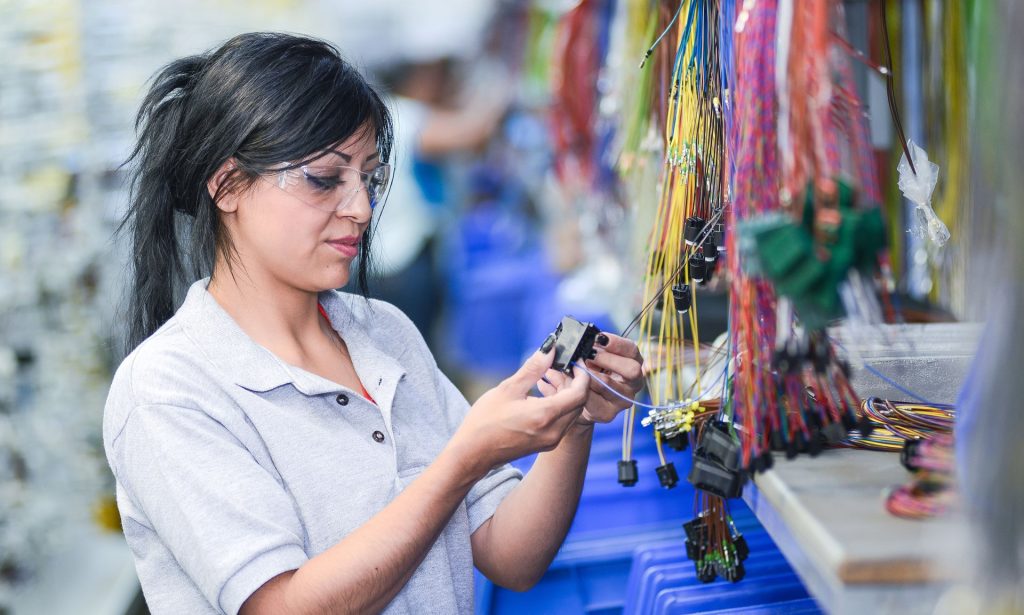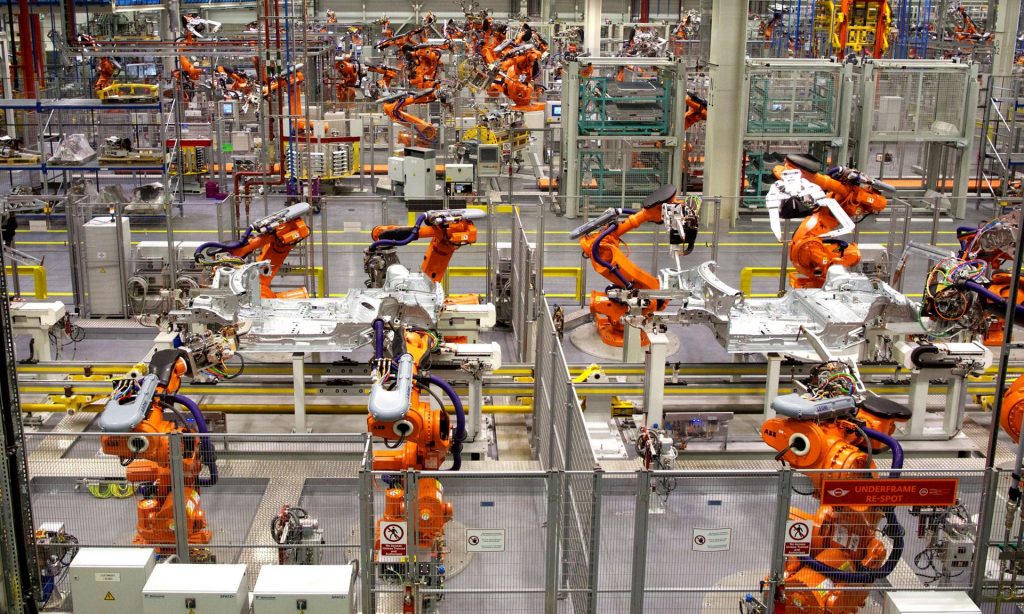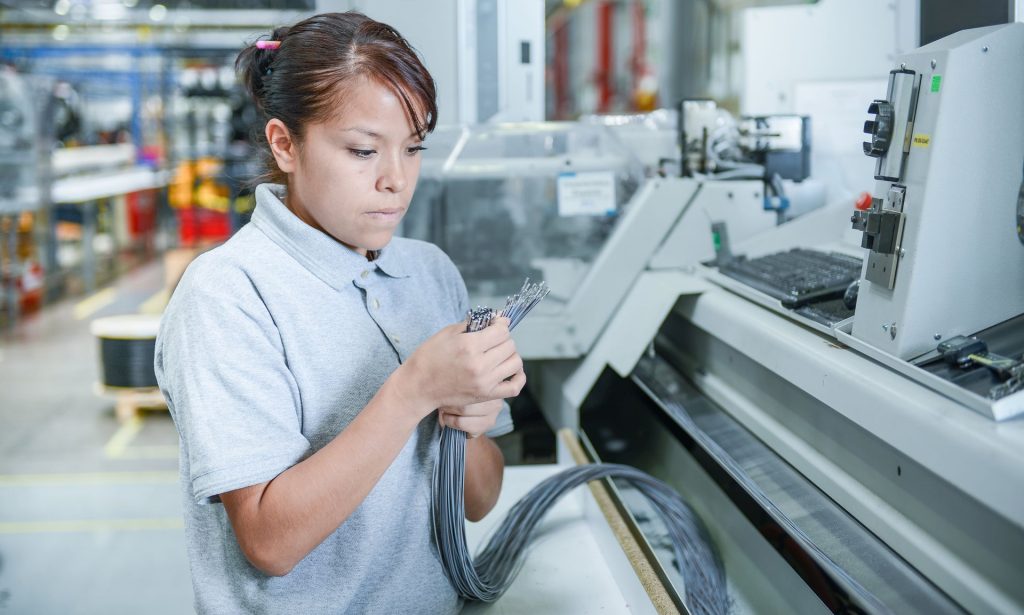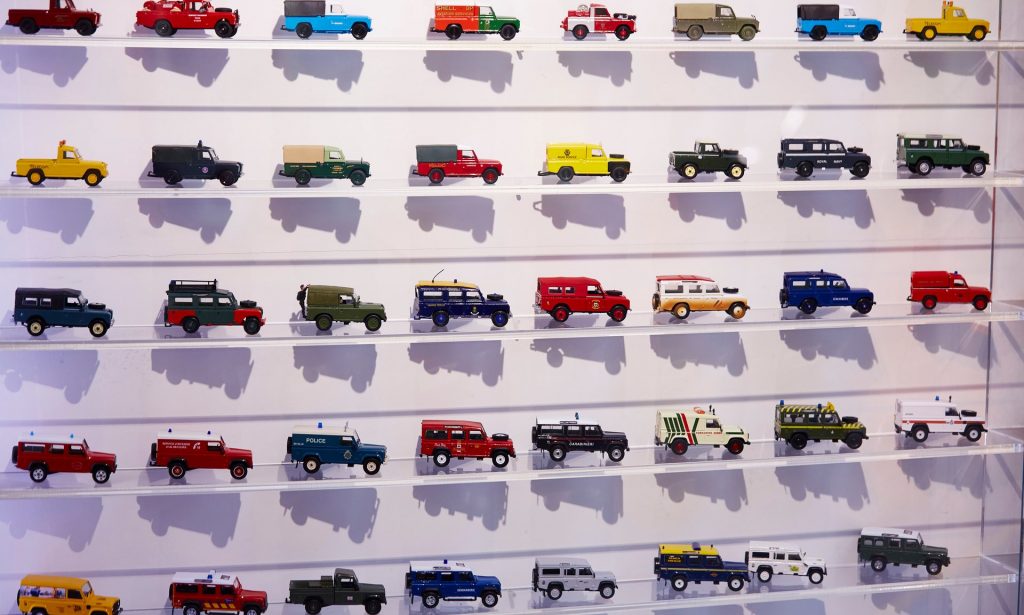
Photograph: Dräxlmaier Group
When Bavarian politicians rhapsodise about their “laptop and Lederhosen” economy, they most likely have in mind businesses such as Dräxlmaier in Lower Bavaria.
The slogan encapsulates the state’s transition from agriculture to hi-tech hub. And founded in 1875 as a family business making the traditional leather garments beloved in this southern German state, Dräxlmaier has managed to do just that – cornering the global market for leather dashboards as well as onboard electronic systems for premium car brands, employing 55,000 people worldwide.
At the company’s headquarters in Vilsbiburg, craftsmen working with the precision of miniature train enthusiasts share a workspace with hi-tech robots.
Britain, a ravenous consumer of German luxury cars, is also a key export market for the company: it supplies car parts for the Mini, Jaguar and Land Rover, with external sites in Birmingham, Oxford, Solihull and Stoneleigh, in Warwickshire. In Bavaria, it is not alone in having fostered such close ties across the Channel: for 1,500 companies in the region, Britain is the second biggest export market after the US. Last year, Bavaria exported €15.5bn (£13bn) worth of goods to the UK – up 22% on 2014.

Photograph: Andrew Cowie/AFP/Getty Images
If those in charge of negotiating Britain’s exit from the EU are to be believed, that trade relationship is the EU’s achilles heel. Once officials in Brussels threaten Britain with tariffs, they argue, German industry will be at Angela Merkel’s door in a flash, demanding the preservation of the status quo.
Tobias Nickel, Dräxlmaier’s head of corporate communications, openly states that his industry would lobby Berlin against barriers to trade: “Let’s say we would do our best to draw attention to the consequences that tariffs would have.”
Frank Dollendorf, director of economic affairs for the Bavarian Chamber for Industry and Commerce – which has described the referendum result as “a slap in the face” – told the Guardian that “we would do everything to raise our voice”, especially after his industry had to look on as politicians imposed trade sanctions on Russia.
But a closer look inside Dräxlmaier’s workshops in the Alpine foothills reveals a more complicated picture. The argument put forward by advocates of a hard Brexit, where Britain leaves the EU with a minimal or no trade deal, is that its trade deficit lends it some leverage in negotiations: if cars made by BMW or Volkswagen become too expensive, British customers could simply switch to Nissan or Toyota instead.
The problem is that German car manufacturers no longer build all their cars in Germany, and even if they do, they do not necessarily build them with fully “German” parts.
At Dräxlmaier’s HQ, employees build prototypes for dashboards. Once crash-tested, the plastic core is mass-produced in Poland, bit-parts are manufactured in Tunisia and Japan, leather is made from Austrian cows and all components are finally assembled in Tamworth, Staffordshire, before being delivered to the relevant car manufacturer.

Photograph: Dräxlmaier Group
Nickel likens trade relations between Britain and Germany to the onboard systems that his company produces: complex, hand-thatched strings of colourful cables that come in billions of variations. “British and German manufacturing are so deeply intertwined, untangling these ties is basically impossible,” he said. “In the 1950s, maybe, but not now. You can bake English bread using only English flour. But you can’t make English cars from English parts. It’s impossible.”
While barrier-free trade with Britain is important to German manufacturing, so are open borders. “Freedom of movement is massively important for us,” Nickel said. In Vilsbiburg, a large part of the workforce is focused solely on the logistics of transporting different components to the right place at the right time. At the height of the Arab spring protests, the company had to improvise not to break the supply chain from Tunisia, at one point flying in individual parts.
Unpredictable queues at border points would potentially ruin the so-called “long workbench” model of production that has allowed German carmakers to thrive in a globalised age.
Free movement also matters to Bavarian industry because the region has a shortage of skilled labour. With 37,000 empty Bavarian apprenticeship posts, one of the few silver linings that many German business leaders see in Britain’s vote to leave is that it may drive eastern European talent to Germany that has previously opted for the UK.
At Bavaria’s Chamber for Industry and Commerce the main fear is that Britain leaving the EU will lead to more bureaucracy. When Bayern Munich travels to Moscow for a football match, the chamber currently has to issue them with a Carnet ATA, an international customs document that certifies the country of origin and confirms that the team will return its coach, shirts and boots after the match rather than selling them outside the single market.
If Britain were to end up radically breaking trade ties with the EU, Dollendorf fears that his trade body would end up having to spend approximately one extra day a week processing documents of this kind. Medium-sized, or Mittelstand, companies without their own tariff department, he said, would be hit especially hard.
“If we were forced to make a choice between access to the British market and preserving the common market in Europe, we would go for the common market,” said Dollendorf.

Photograph: Christopher Thomond for the Guardian
According a poll published this week by the Allensbach Institute for Public Opinion Research, such views are widely spread not just in Bavaria but throughout Germany. A majority of medium-sized and large companies indicated support for the EU taking a hardline stance against Britain after the referendum, with 56% saying they were in favour of the advantages of EU membership being revoked for the UK.
The study also shows 58% of German business and political leaders surveyed said they believed an exit from the EU would do “massive damage” to the UK economy, while 77% believed the referendum outcome would only have “minor consequences” for the German economy.
David Davis, the British minister in charge of Brexit negotiations, argued in a recent article on Conservative Home that Britain could import more tariff-free electronic parts from Asia in the future, boosting its manufacturing base and eventually exporting cars rather than importing them from Germany.
Confronted with such an argument, Dräxlmaier’s Nickel remained calm. “Britain has to understand that it can’t produce a Rolls-Royce on its own. It would really surprise me if the UK would sacrifice its last remaining industry on the altar of Brexit.”

